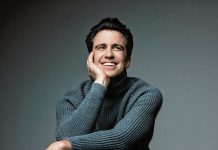A Columbus North High School graduate’s future involves both professional aspirations and his passion.
Mason Engel, a senior at Purdue University, is majoring in mathematics, and he intends to run the financial website he founded, OneSpotAid.org, after graduation. However, he plans to move to New York City to be closer to publishers and literary agents so he can focus on writing.
The 22-year-old is a science-fiction author who has written five novels, several short stories, screenplays and poems. One of those, “2084,” was written and published on Amazon as a young-adult spinoff of George Orwell’s novel “1984.”
The novel was the No. 1 best seller in Amazon’s free Two-Hour Science Fiction and Fantasy Short Reads section in March and currently has 4.3 out of 5 stars based on reader reviews on Amazon.
[sc:text-divider text-divider-title=”Story continues below gallery” ]
Engel recently took time to read some of his earlier works to an audience of about 200 fourth-, fifth- and sixth-grade students at Hope Elementary School. He wanted to share the importance of reading with the students, who were belatedly celebrating Read Across America and Dr. Seuss’ birthday.
The Republic caught up with Engel to ask about his time with the students and his experiences as a writer.
How did you get interested in writing?
I have always loved to write, but growing up I wasn’t really able to write outside of my English classes because I was always occupied with sports. In high school especially, soccer took up almost all of my time.
It wasn’t until my senior season ended that my schedule started to open up. I would come home after school every day and just sort of sit there, not really knowing what to do. After a few weeks of this, a friend and I were talking during class — English class, as fate would have it — when I got my first idea for a novel, which would eventually became a trilogy.
That day, I went home and started writing. I kept the book secret for months. When it was finished, I asked a family friend to print and bind a copy, then I dedicated the book to my girlfriend at the time as a way of asking her to prom. That was my motivation to finish the first book, but by the end of it I didn’t need that motivation; I had fallen in love with telling stories.
You wrote and published a story called “2084,” which you have described as a young-adult version of George Orwell’s “1984.” Was there any social commentary woven into your story?
I think any good story contains at least a small amount of social commentary. In the case of “2084,” that amount depends on the reader. The story can be read at face value, by someone who is interested only in being entertained for an hour or so, or it can be read at a deeper level.
For the second kind of reader, I’ve deepened the story in two ways. First, I told the story in extremely close parallel to “1984.” Some of the connections are obvious, but some are more hidden. Second, I tried to highlight certain realities of our world. In the story, one of the main issues is privacy. In our world, privacy, if not now then in the near future, is being threatened by “big data.” In the story, the divide between government and business is murky at best. In our world, the power of corporations actually exceeds that of many governments. In the story, the major movements are, at their root, founded on pure intentions in spite of their ultimately nefarious effects.
I think the message of “2084” is important to share, not because it is directly predictive of our future, but because it instills in people the caution needed to avoid a potential version of it.
What made you decide to speak to the students at Hope Elementary School?
Hope Elementary had just gotten done with two weeks of state testing and they were using (March 10) to celebrate Read Across America Day and Dr. Seuss’ birthday.
They read for a good portion of the day before I got there in the afternoon, so they were well prepped to receive a talk about the importance of reading and writing. I knew it would be a great opportunity to share what I had learned about writing and hopefully influence kids in a positive way. When I got the invitation, there was no way I could turn it down.
How did the talk with students go?
I think the talk went really well. I tried to keep things short and to the point and communicate my message as a story, not a lecture. Especially for it being a Friday after two weeks of testing, and it being the last day before spring break, the kids were really attentive.
When I read a little poem I had written, a riddle about a school bus, they guessed what the poem was about in only a few tries. After I was done, they asked a lot of questions about what my favorite books were and why I started writing.
Why do you feel it is important to read?
When we read a story, we develop an interest in its characters. We want to understand them — their tendencies, their motivations, their faults — so we start trying to see things from their perspective. This effort to empathize becomes a habit, and before we know it, we’re empathizing not only with the characters on the page but with those off it, too, the characters in our own stories. We begin to understand people around us at a deeper, richer level, and we become better people ourselves as a result.
Where can people find “2084” if they would like to read it?
To read “2084,” people can get the kindle book for free by searching “2084 Mason Engel” on Amazon or they can download the PDF and audio version by going to masonengel.com/2084. There is also a paperback version available, but that costs around $5. I made it as cheap as possible, but that was the best Amazon could do.
What advice do you have for aspiring writers?
Be prolific. It’s advice no aspiring author ever wants to hear. I definitely didn’t want to hear it when I was first starting out. With time, though, I’ve learned the reality of it: If you want to be a great writer, you must write prolifically.
Everyone likes to think the first novel they write is the greatest thing in the world, but it almost never is. Finishing a novel is a tremendous accomplishment and should be celebrated as such, but the finished product, for a first-time writer at least, will be disappointing.
Writing is just like anything else: It takes practice, it takes time. No one who is just starting out wants to hear that, but it’s true. To master language, you have to write as much as possible. The earlier on an aspiring writer can accept the length of the journey, the better off he or she will be equipped to undertake it.
My bonus piece of advice regards editing. It’s impossible to objectively evaluate and alter your work immediately after finishing it. You’re too close. Take a few weeks — better yet a few months — and then revisit it.
[sc:pullout-title pullout-title=”Abput Mason Engel” ][sc:pullout-text-begin]
Age: 22
High School: Columbus North High School, class of 2013
College: Purdue University, senior, intends to graduate in May.
Major: Mathematics
Family: I have two mothers. My biological mom is Denise Engel; my other mom is named Lisa Elkins. Both reside in Columbus.
Favorite quote: “We cannot let our angels go. We do not see that they only go out that archangels may come in.” – Ralph Waldo Emerson.
[sc:pullout-text-end]




